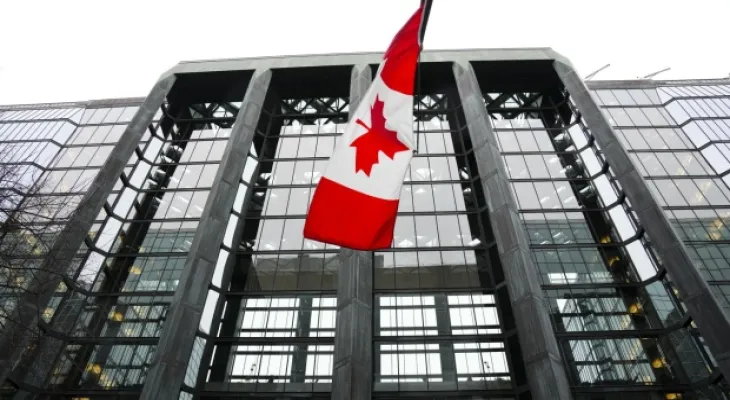Search here
Newspaper
Search here

Arab Canada News
News

Published: October 22, 2023
It is widely expected that the Bank of Canada will keep the key interest rate steady on Wednesday as the Canadian economy leans towards higher interest rates and inflation resumes its downward trend.
The central bank held the key interest rate steady at five percent last month but left the door open for further rate hikes, citing concerns about ongoing core price pressures.
RBC's Deputy Chief Economist Nathan Janzen and economist Claire wrote in a note on Friday, "Economic data releases since the Bank of Canada opted to forego a rate hike in September have been mixed, but we expect that making a rate hike in next week's decision unlikely."
The annual inflation rate rose in July and August, while core inflation measures - which exclude volatile prices - have not declined much in recent months.
However, the September Consumer Price Index report helped ease some of these concerns, with the pace of price growth across the economy slowing and the annual inflation rate retreating to 3.8 percent.
Andrew Grantham, the managing director of economics at CIBC, said, "We were breathing a sigh of relief after the latest inflation numbers."
He stated, "The latest inflation figures suggest it has started to slow again. This, along with the sluggish growth we have seen, is likely to keep the (Bank of Canada) on hold, not just this meeting, but really for the rest of the year, and into next year as well."
The Canadian economy contracted in the second quarter. Economists expect the weakness to continue for the rest of the year and into 2024.
A recent Business Outlook Survey conducted by the Bank of Canada supported these expectations. It showed that business sentiment continued to weaken in the third quarter as companies reported expecting a slowdown in sales growth over the next year.
On the job front, employment continues to rise as Canada's population grows, but the labor market is not as strong as it was in 2022. Job vacancies have declined, and the unemployment rate has risen to 5.5 percent.
The pace of consumer spending has also slowed, with Statistics Canada reporting on Friday that new Canadian retail sales fell by 0.1 percent to $66.1 billion in August, with declines in sales at both new and used car dealerships for the month.
These trends are expected to persist as the impact of previous rate hikes affects the economy, impacting the pockets of more Canadians and businesses.
In particular, as more households renew their mortgages, rising interest rates are expected to affect more people.
Grantham said, "We know there is more to come because we know that less than 50 percent of mortgage holders in Canada have faced higher interest rates."
Most economists expect these weaker economic conditions and tighter financial conditions to eventually bring inflation down to 2 percent.
While sticky core inflation is likely to remain a concern for the Bank of Canada, Grantham expects this concern will be taken into account in the central bank's decision on when to cut interest rates, rather than whether to raise rates further.
On the international front, the global economy faces some uncertainty amid the war between Israel and Hamas, which threatens to destabilize the Middle East.
Grantham said, "We are seeing, globally, that inflation-related risks have increased. If the conflict in the Middle East escalates, wars are inflationary. There’s no other way around it."
Central banks are well aware of what wars can do to prices: the Russian invasion of Ukraine in February 2022 significantly contributed to the initial spike in inflation as commodity prices soared.
Last week, Bank of Canada Governor Tiff Macklem said it is too early to know the economic ramifications of the war between Israel and Hamas.
"It is very early to know that. It really depends on how far... this escalates," said Macklem.
The Bank of Canada’s interest rate decision will be accompanied by a quarterly monetary policy report, which will include updated forecasts for global and domestic economies as well as inflation.
Comments